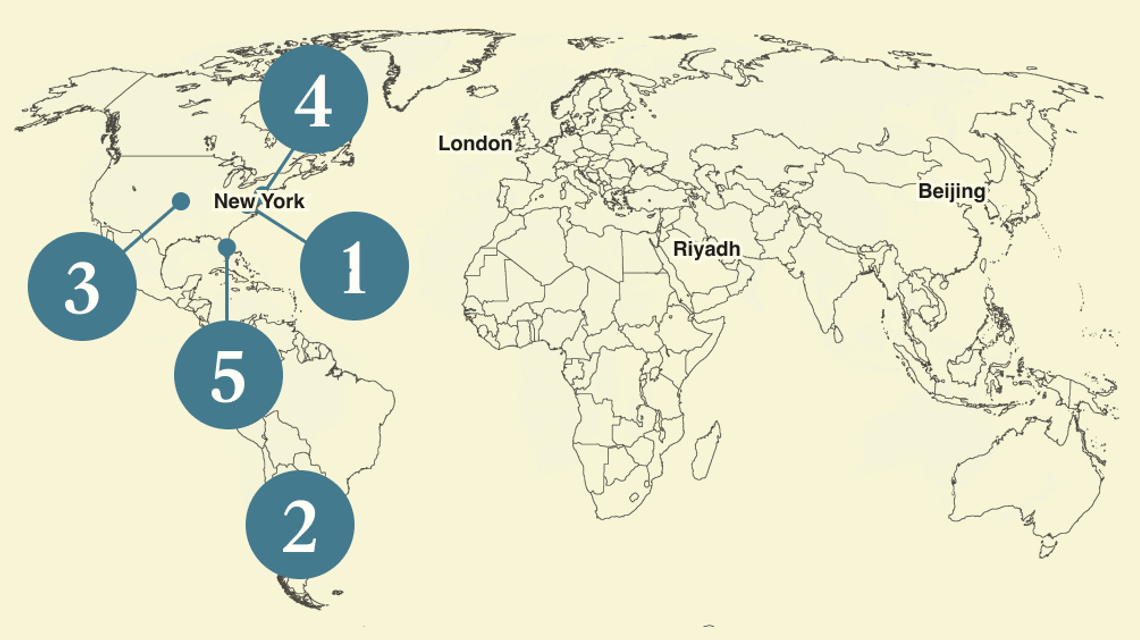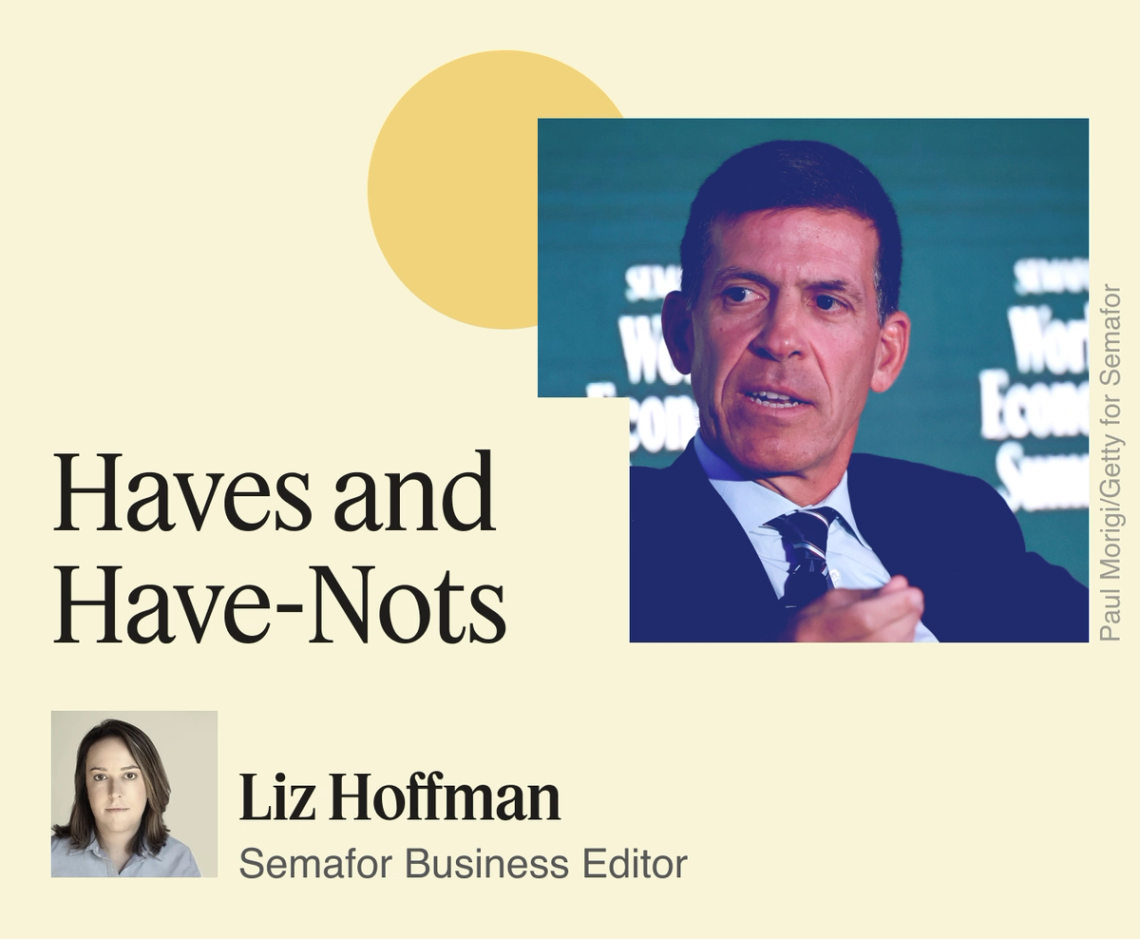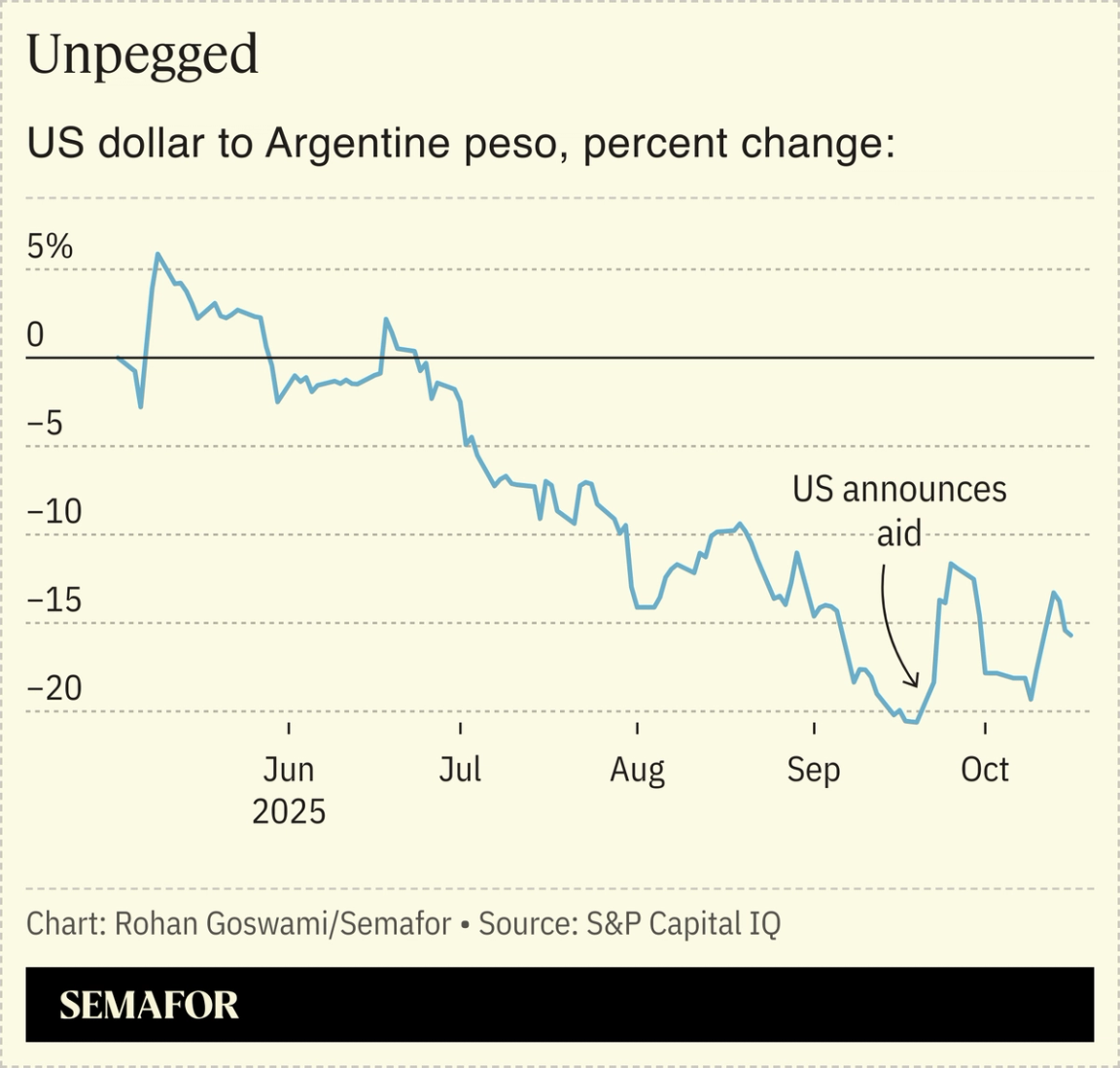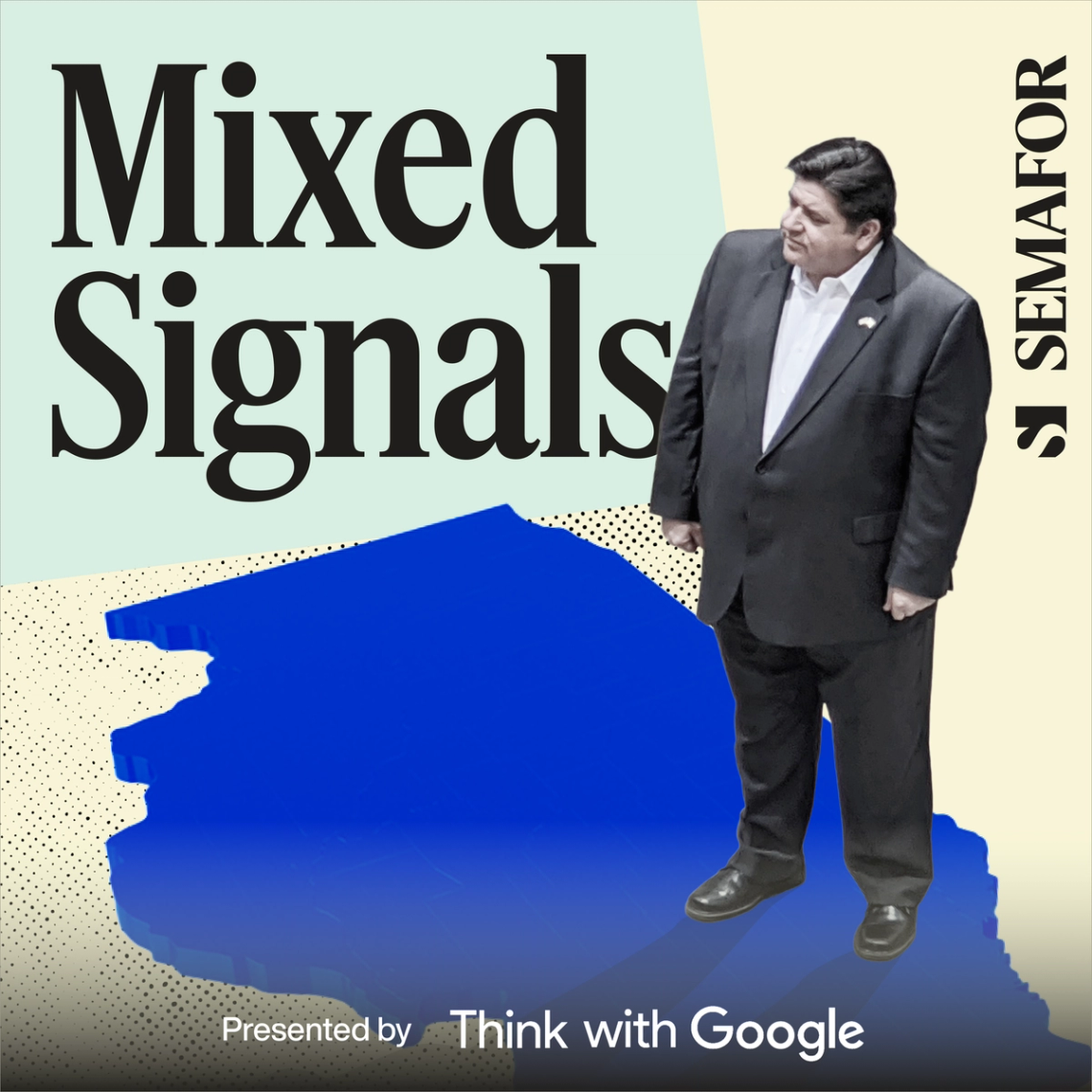| | In this edition, how the economic gap is widening, and US mega banks consider throwing Argentina a l͏ ͏ ͏ ͏ ͏ ͏ |
| |  | Business |  |
| |
|
 - Fed’s Miran on robot dystopia
- US banks ready Argentina aid
- Bank M&A tailwinds
- Stocks and bets
- 777 indictment
 Five-figure baby bonuses … Robby Starbuck shunned at corporate HR summit |
|
 Hi from Washington, where we hosted executives and policymakers at Semafor’s World Economy Summit to try to get a handle on where the global economy is and where it’s heading. Two data points on my mind this week: Delta Air Lines’ prediction that its sales from premium seats will overtake sales from coach as soon as next year, and the swift collapse of an overleveraged retailer of windshield wipers and spark plugs. They may not seem connected, but they hint at what Goldman’s John Waldron told me on stage is a “two-speed economy.” High earners are doing just fine. They own most of the assets now appreciating in today’s everything rally. So are their corporate equivalents, blue-chip companies that can borrow insanely cheaply and at least partly control their tariff pain through purchasing muscle. The unraveling of auto-parts supplier First Brands, meanwhile, is better understood not as an indictment of private credit — a lot of the lending to First Brands and Tricolor, another unfolding debt mess, came from banks, not their lightly regulated competitors, as Blackstone’s Jon Gray noted — but as a sign of problems in the bottom leg of an increasingly K-shaped economy. “Those on the lower end of the economy are suffering, and there’s been a lot of lending in there,” Waldron said in a wide-ranging interview that’s worth watching (Investors are looking at China again!) “So if there’s been a lot of lending in there and there’s weakness in consumer capability and wealth and health in there, we’re going to have more of a problem.” For consumers, the dividing line, Navy Federal Credit Union’s economist told PBS, is an income of $175,000 a year. For companies, it might well be an A- credit rating. Companies like Microsoft, which can now borrow more cheaply than the US government, and wealthy travelers splurging on leg room are in one camp. The record share of credit-card users behind on their bills are in another, along with First Brands, which is now in bankruptcy protection, sorting through a rat’s nest of debt it could never afford and never should have taken on. Today’s newsletter has the biggest takeaways from the World Economy Summit stage, plus a scoop on Wall Street’s $20 billion assist to Treasury Secretary Scott Bessent in his bid to pull Argentina and its Trump-allied president back from the economic brink. And a story we broke back in 2023 — a warning for how finance’s new obsession with insurance money could end badly — results in a criminal indictment in Manhattan. |
|
The Fed’s newest face on AI doomerism |
  Paul Morigi/Getty Images for Semafor Paul Morigi/Getty Images for SemaforWhat do robot armies mean for the Fed’s dual mandate? We posed that question to Stephen Miran, the central bank’s newest governor, asking whether an AI explosion that brings jobless growth — huge gains in productivity and wealth but extreme unemployment — would complicate the Fed’s job of maximum employment. “Right now, I think 30% unemployment is deeply incompatible with maximum employment,” Miran said. “But in a world in which technological change is so wild that something like that is happening, I think you’d have to say ‘OK, what is maximum employment?’ I don’t know.” |
|
Banks ready Argentina lifeline |
Big US banks are in talks with the US Treasury to provide up to $20 billion in loans to Argentina, people familiar with the matter said. JPMorgan, Bank of America, Goldman Sachs, and Citigroup are among lenders working on an emergency loan backed by Argentine assets, the people said.  Treasury Secretary Scott Bessent said Tuesday that a $20 billion private-sector financial package could be “adjacent” to the $20 billion in financing that the Trump administration has already promised to Argentina, where a collapsing currency has spread economic unrest ahead of elections that will determine whether President Javier Milei, an ideological ally of President Donald Trump, remains in office. Commercial banks participating in foreign bailouts is unusual but not unheard-of: About $3 billion of the $50-billion 1995 Mexican rescue came from the private sector. |
|
The need for bank mergers, served three ways |
  Paul Morigi/Getty Images for Semafor Paul Morigi/Getty Images for SemaforThe US has more than 8,000 banks and credit unions, with a small group of giants continuing to suck deposits from community and regional lenders. It’s time for change, executives from disparate parts of that financial ecosystem told Semafor this week. “Do we want a couple of megabanks to just keep getting larger and larger?” asked Mark Wiedman, president of PNC, the Pittsburgh-based lender stuck just outside the Too-Big-To-Fail Club and keen to join it. Its first step was the takeover announced last month of a Colorado bank. Most of PNC’s growth will come from building new branches, Wiedman said, but takeovers will fill in geographic gaps, too: PNC has been on the hunt since 2023, when it was shut out of the bidding for failed First Republic, which was sold in a fire sale to JPMorgan. “That was annoying,” Wiedman said. “Through a lack of forethought by the policymakers, we allowed a dominant bank to get even more dominant.” He has support from surprising corners. “You go to every small town, there’s a different bank — probably doesn’t have a website, oftentimes doesn’t have that good of a consumer app, if they have one at all,” said Zach Perret, CEO of Plaid, which connects consumer accounts across thousands of far-flung financial firms. “Many of those, yes, they should be consolidated.” Europe, meanwhile, treats its subscale and profit-squeezed banks as national treasures at its peril, said Greek Finance Minister Kyriakos Pierrakakis. The country recently allowed Italy’s Unicredit to buy a large stake in Alpha Bank: “We need more mergers and acquisitions happening across our borders within Europe,” he said. |
|
The coming collision of stocks and bets |
  Paul Morigi/Getty Images for Semafor Paul Morigi/Getty Images for SemaforOnline betting markets are “the next evolution into what’s driving the markets that we run,” New York Stock Exchange President Lynn Martin said Wednesday. NYSE’s parent company recently invested $2 billion into Polymarket, a leading online predictions site that is “focused more on geopolitical” outcomes that can swing stock prices, Martin said. More “sanity” is needed, she added, to curb the kind of retail excesses that spilled over into stock markets during the SPAC and meme-stock booms. “It goes back to regulation and … leveraging that regulatory framework to put sanity around behavior.” Betting markets are in some ways purer than today’s stock market: Outcomes are binary, and, unlike follow-the-crowd stock flows, you only make money if you’re right. But last week’s Nobel Peace Prize front-run — which appears not to have been a leak, but a devoted scrape of corners of the Nobel Committee’s website — shows the risks to the integrity of stock markets in edging too closely to the still-unregulated fringes. |
|
777 co-founder faces fraud charges |
 Andreas Gora/picture alliance via Getty Andreas Gora/picture alliance via GettyUS prosecutors unveiled criminal fraud charges against the co-founder of 777 Partners, an investment firm that tapped into Wall Street’s river of insurance money to back risky deals. Semafor previously reported that Josh Wander was under criminal investigation by the US Attorney’s office in Manhattan, which on Thursday accused him of bilking investors out of $500 million by double-pledging collateral and photoshopping financial statements. Miami-based 777 came seemingly out of nowhere in 2023 to bid for one of the most prestigious (and financially troubled) soccer teams in England, Everton. The source of its money was opaque, always a red flag on Wall Street. Semafor traced it to a pair of US life insurers that had funneled policyholders’ cash to 777’s Bermudan reinsurer, which invested it into sports teams, airplanes, a payday lender, and a failing budget airline, among other bets generally unsuited for insurance guarantees. Wander is accused of lying to lenders and investors, not policyholders, but the case is likely to focus more attention on Wall Street’s insurance push. “This is a business dispute dressed up as a criminal case,” a lawyer for Wander told Semafor. “We look forward to setting the record straight.” |
|
 Chicago is either a war zone quickly spiraling out of control or a peaceful city under siege by an overreaching federal government. It all depends on who you ask — and which channel you watch. This week, Ben and Max talk to Illinois Gov. JB Pritzker about how he’s fighting a messaging battle against the Trump White House. They also talk about how conservative media is shaping the situation on the ground, what he thinks of California Gov. Gavin Newsom’s trolling approach to Trump, and whether we should bet on the Chicago Bears. |
|
➚ BUY: Rare earths. China’s sweeping curbs on exports of rare-earth minerals have opened a new and deepening flashpoint in global trade. Beijing “has found Trump’s pain point,” the BBC writes. ➘ SELL: Common ground. Backlash to data centers is becoming a bipartisan campaign-trail cause, Semafor’s Dave Weigel reports from a local Virginia race. |
|
|